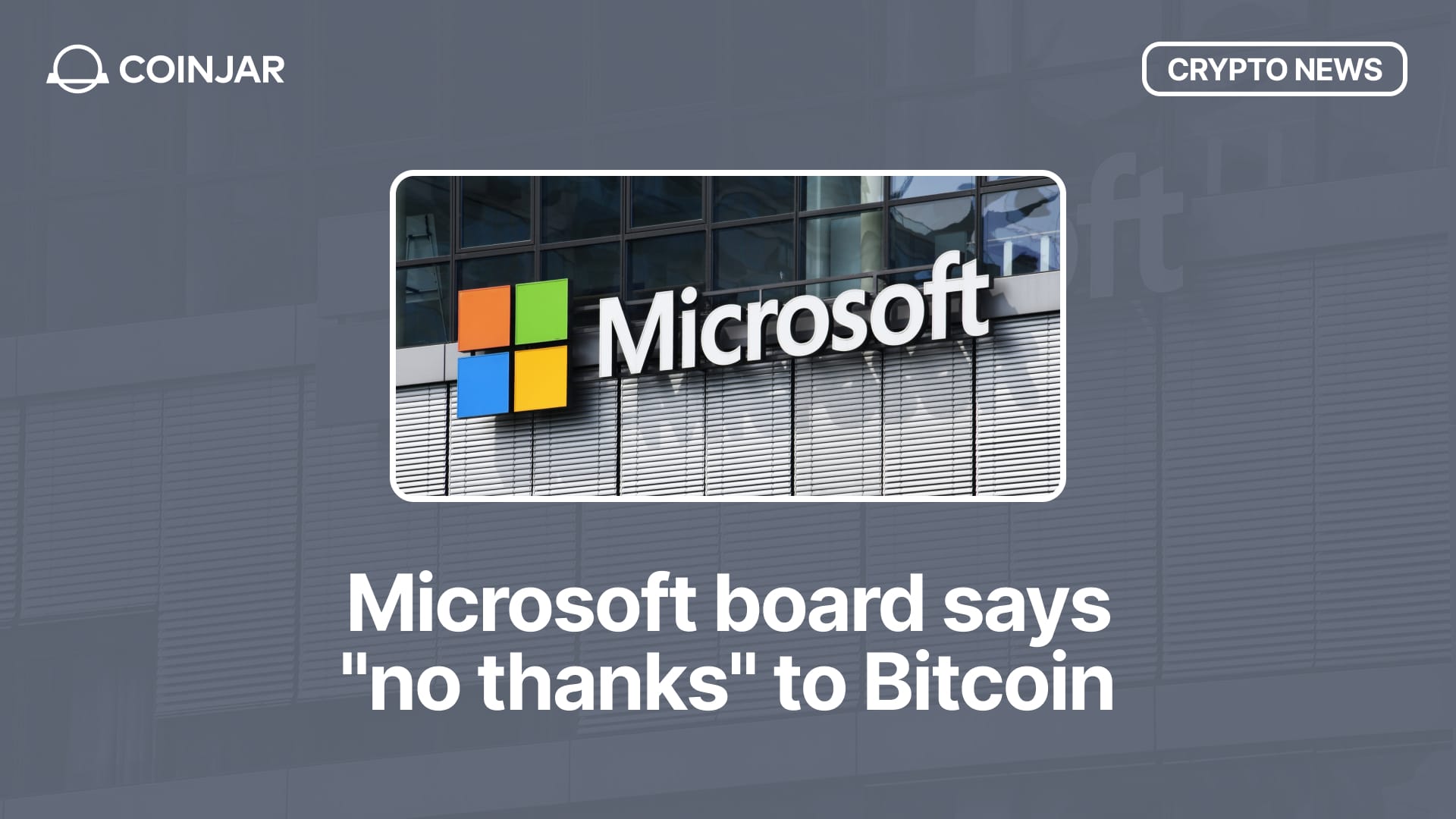Microsoft Board Says "No Thanks" to Bitcoin. What Will Shareholders Vote?
October 30, 2024Will Microsoft shareholders vote to add Bitcoin to the corporation's treasury? Interesting times are coming.

Microsoft shareholders will vote in December on whether the company should to add to its vast treasury. Proponents of Bitcoin believe this would be a smart money move, as Bitcoin is considered to be a good way to and money debasement.
For those with an enthusiasm for traditional finance (TradFi), buying Bitcoin might be a roll of the dice too far into the new economy. But this new economy is , regardless of what TradFi thinks of it.
It’s hard to know at this stage which way will go with their votes. Will they vote to invest in the “new economy”? Or will they play it safe and stick with traditional investments, as recommended by the Microsoft board?
And how do we know all this is happening? Because anyone with the link can nosey in on an with the Securities and Exchange Commission (SEC) in the USA. Yes, you can snoop on the documents with just one click. And this is where all the glorious details of the proposal to buy Bitcoin on behalf of Microsoft have come flooding out.
The “Buy Bitcoin” proposal
The proposal for Microsoft to buy Bitcoin was by The National Center for Public Policy Research (NCPPR).
The NCPPR advocates for free-market principles and limited government intervention. They believe Microsoft should diversify its assets and hedge against inflation by investing in Bitcoin, even if it's a small percentage. They point to with Bitcoin as an example.
Why is this interesting?
This proposal by the NCPPR suggests a broader ideological push for Bitcoin adoption. While they claim it's about shareholder value, some speculate their motives might be related to promoting Bitcoin as a way to challenge traditional financial systems.
While the NCPPR might not have huge direct influence on Microsoft, their proposal has sparked a conversation and brought attention to the idea of large companies investing in Bitcoin.
Reaction of Microsoft’s board of directors
Microsoft's board is recommending shareholders vote against this proposal, saying their existing investment strategies are just fine thanks.
But here’s the juicy bit: The fact that this proposal even exists highlights the growing debate about the role of Bitcoin in corporate treasuries.
The Microsoft board humans are all from traditional corporate backgrounds, and this is why they may seem adverse to the idea of corporate treasuries holding Bitcoin.
Microsoft's Board of Directors as of October 29, 2024
Satya Nadella is the overlord of Microsoft. His opinion on the Bitcoin proposal definitely matters, but it is not likely not the sole deciding factor. If it was, it would be easy to assume he would be pro-Bitcoin.
Nadella started his in 2014. In , Microsoft started exploring blockchain technology and released Azure Blockchain as a Service. Nadella is au fait with blockchain matters, which is the tech that Bitcoin rides on.
However, CEOs come and go. The Board of Directors function as a group. They have a fiduciary duty to act in the best interests of the company and all shareholders. Even if Nadella personally liked the idea of Bitcoin, he'd need to convince the rest of the board.
Who is on the board at Microsoft?
Let’s take a look at the Microsoft “”.
Hugh comes from Disney and was formerly PepsiCo's CFO. He has a long history in finance. So it would be easy to assume that he likes stable, established investments. Bitcoin's volatility might give him the willies.
comes from Gap Inc and is the former CFO of Kraft Foods, and also Procter & Gamble. Similar to Johnston, her background suggests a focus on traditional financial management and risk aversion.
is Automatic Data Processing (ADP) Inc.’s CEO. Deep experience in payroll and human resources, it would be easy to think that he might see Bitcoin as an unnecessary distraction from core business.
is the chairman of Trilogy Partnerships. This is a private equity fund that invests in the wireless ecosystem. He might be more open to tech investments, but still likely to prioritise long-term stability.
is an operating partner at Clayton, Dubilier & Rice. This is a private investment firm. She’s the former Group Worldwide Chairman of Johnson & Johnson. With a healthcare background, she may be risk-averse when it comes to company finances.
is the CEO of Wells Fargo. It would be safe to assume he is very familiar with financial regulations and the potential regulatory minefield of crypto in the USA.
is the CEO of GSK. She has pharmaceutical industry experience, and it would be an easy leap to presume that she probably prioritises steady growth and avoids unnecessary financial risks.
is the founder of PSP Partners, and the former U.S. Secretary of Commerce. As part of Microsoft's Environmental, Social, and Public Policy team, she might see Bitcoin's perceived energy consumption as a problem.
is a LinkedIn co-founder, and Partner at Greylock Partners. While tech-savvy, he is also known for thoughtful investments. He may be concerned about Bitcoin's environmental impact or use in illicit activities.
is an executive with extensive experience in the energy sector. She became the CEO of Engie in 2021. Bitcoin mining’s perceived energy requirements might be at odds with Engie's focus on sustainable energy solutions and reducing carbon emissions.
has held key leadership positions in major financial institutions, including Goldman Sachs, and Citi Private Bank. As CFO of a major bank, Mason is acutely aware of the regulatory landscape. The lack of clear and consistent regulations around Bitcoin and other cryptocurrencies could be a major concern.
Plusses and minuses
Should companies just focus on what they're good at? Microsoft is good at software and technology, not investing in Bitcoin.
Ryan Zhou, COO of crypto platform , highlights that most institutional investors prefer companies to focus on their core strengths rather than diversifying into unrelated investments. “It’s almost always better to have the company return the cash to shareholders, and shareholders can gain their own exposure to that investment,” says Zhou.
In this case, if Microsoft shareholders want exposure to Bitcoin, they can invest in it directly themselves. There’s no need for Microsoft to hold it on their behalf.
Zhou notes that in a company as vast as Microsoft, management may see strategic value in diversification as a way to capture emerging markets or trends, whereas shareholders typically prioritise maximising returns from the company’s core business. “Management might pursue diversification to stay relevant in a rapidly evolving tech landscape or to align with broader innovation trends,” he explains. “But shareholders often want resources directed toward areas where the company already has a competitive advantage.”
So will the Microsoft shareholders vote to buy Bitcoin? Will they rebel against the board who come from TradFi backgrounds?
We are guessing… yes.
Author profile
Nicole Buckler has been a crypto culture journalist for multiple leading publications for several years. She first bought Bitcoin in 2013, not really knowing what she was doing at the time. Since then she has learned how to handle a coin or two.
Got a comment? Nicole.Buckler@CoinJar.com
On/Offchain
Your weekly dose of crypto news & opinion.
Join more than 150,000 subscribers to CoinJar's crypto newsletter.
Your information is handled in accordance with CoinJar’s .
More from CoinJar Blog
CoinJar’s digital currency exchange services are operated by CoinJar Australia Pty Ltd ACN 648 570 807, a registered digital currency exchange provider with AUSTRAC.
CoinJar Card is a prepaid Mastercard issued by EML Payment Solutions Limited ABN 30 131 436 532 AFSL 404131 pursuant to license by Mastercard. CoinJar Australia Pty Ltd is an authorised representative of EML Payment Solutions Limited (AR No 1290193). We recommend you consider the and before making any decision to acquire the product. Mastercard and the circles design are registered trademarks of Mastercard International Incorporated.
Google Pay is a trademark of Google LLC. Apple Pay is a trademark of Apple Inc.
This site is protected by reCAPTCHA and the and apply.